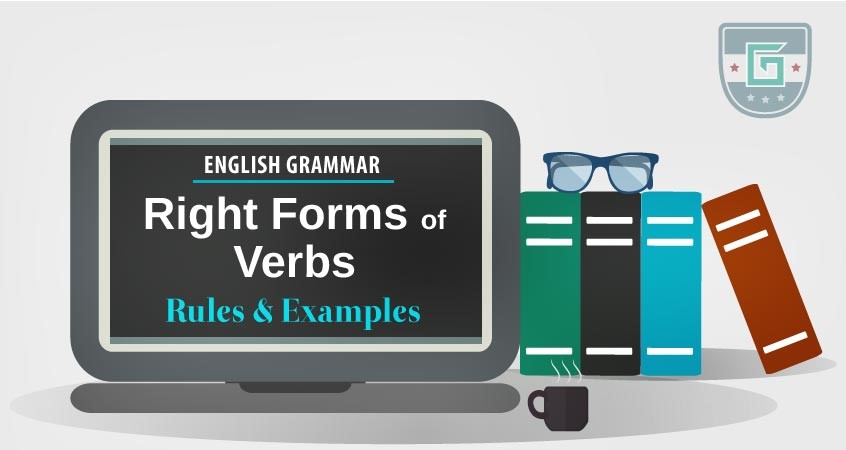Verbs are the most variable component of a sentence. They take different forms according to tense, person, voice, moods, modals, subject-verb agreement, etc. To grasp the concept of the right form of verbs, we need to master the rules first.
However, if you want to truly make your learning curve easier, you can enroll in 10 Minute School’s ‘ঘরে বসে English Grammar‘. With 100 videos and notes, this course will not only help you understand verb formation but enhance your overall grammar understanding.
Here are 30+ Rules of the Right form of verbs in English, which you should definitely master:
Right form of verbs Rule #1: 3rd Person & singular number
If your subject is 3rd Person & singular number and the verb is in Simple Present Tense, then. Also, It is not applicable for other Tense.
Add ‘s’/’es’ to the verb to make it plural.
Example:
- He drinks coffee.
- She eats rice.
Right form of verbs Rule #2: Universal Truths
In the case of Universal truth & the habitual fact:
The sentence is in Simple Present Tense.
Example:
- The sun gives us light.
- Humans are mortals
Right form of verbs Rule #3: Present Continuous
If the work is continuing at present:
The verb is in the present continuous. Indicative words: now, at present, at this moment, etc.
Example:
- She is singing now.
- He is reading.
Right form of verbs Rule #4: ‘just’, ‘just now..’, etc
If a sentence contains just, just now, already, yet, ever, lately, recently, etc., then:
The verb will be in the present perfect tense.
Example:
- He has just left the house
- I have already done this research
Right form of verbs Rule #5: Past time
If a sentence contains words indicating past time, such as yesterday, ago, long since, etc., then:
The verb will be in the past form.
Example:
- I went to my village home last week.

Right form of verbs Rule #6: ‘No sooner had…than’
If a sentence contains “No sooner had …. than”, “scarcely had when”, “hardly had before”, etc., then:
The first verb will be in the past participle form and the second verb will be in the past form.
Example:
- No sooner had the thief seen the police than he ran away.
- Hardly had I reached the stop when they came.
Right form of verbs Rule #7: ‘since’
If the first part of ‘since’ is in present indefinite or present perfect tense then the next part will be past indefinite.
Example: It has been many years since I came to Paris.
If the first part of ‘since’ is in past indefinite tense then the next part becomes past perfect.
Example:
- It was many years since they had first met.
ঘরে বসে Spoken English
কোর্সটি করে যা শিখবেন:
Right form of verb Rule #8: ‘nor, or, either..’
When nouns or pronouns are joined by ‘or, nor, either…or, neither… nor’:
The verb form usually agrees with the noun that is closest to the verb.
Example: Neither the President nor the two houses are governing now.
Right form of verb Rule #9: ‘after’
If the first part of ‘after’ is in past indefinite tense, then the next part will be past perfect.
Example:
- The teacher started the class after Raju had come.
Right form of verbs Rule #10: ‘while’
If the verb
- comes after ‘while’, then the verb will take ‘ing’ with it.
- if comes after ‘while + subject’, then the verb will be in the past continuous tense.
Example:
- While going to school, I saw a snake.
 Read more: Subject-Verb Agreement With The Batman
Read more: Subject-Verb Agreement With The Batman
Right form of verbs Rule #11: ‘to be’ and ‘having’
The main verb after ‘to be’ and ‘having’ takes past participle form.
Example:
- He ran away having taken the money.
Right form of verbs Rule #12: Future indicative words
For future indicative words like ‘by this time, by morning, by Sunday’, etc., then:
The verb will be in the future perfect tense.
Example:
- They will have reached by this time.
Right form of verb Rule #13: ‘tomorrow’, ‘next year’, etc
If a sentence contains tomorrow, next year, coming month, etc., then:
the verb will be in the future indefinite tense.
Example:
- I will leave for Kolkata tomorrow.
Right form of verb Rule #14: two verbs
If a simple sentence contains two verbs, then:
The 2nd verb will take ‘ing’ or ‘to’ before it or will take the past participle form.
Example:
- I saw him running
Right form of verbs Rule #15: ‘had rather’, ‘had better’, etc.
If a sentence contains ‘had rather’, ‘had better’, ‘would better’, ‘let’, ‘would rather’, ‘dare’, ‘must need’, etc, then:
- The verb is in the present form.
- If there is ‘to’ before that verb, the ‘to’ will be omitted.
Example:
- You had better go to the class.
Right form of verbs Rule #16: ‘it is time’
The verb after it is high time, it is time, wish, fancy, etc. will be in the past form.
Example:
- It is high time we did the work.
Complete English Grammar Course
কোর্সটিতে যা যা পাচ্ছেন:
Right form of verb Rule #17: ‘though’, ‘as if’, etc.
After as though, as if, wish, etc., the ‘to be verb’ transforms into ‘were’.
Example:
- I wish I were a butterfly.
Right form of verbs Rule #18: ‘as though/as if’
If the first part of ‘as though/as if’ is present indefinite, then the next part will be past indefinite.
If the first part is past indefinite, the next part will be past perfect.
Example:
- He speaks as though he knew everything.
Right form of verbs Rule #19: Modal auxiliaries
The principal verb takes the present form after modal auxiliaries.
Example:
- One should not waste time.
Right form of verb Rule #20: ‘am’, ‘is’, ‘are’, etc.
The verb after
- am, is, are, was, were, takes ‘ing’ inactive form,
- But it will be in the past participle in passive form.
Example:
- He is doing the work
Right form of verbs Rule #21: Causative Verb
If have, has, had, got, etc. work as a causative verb in a sentence, then:
The verb after them will be a past participle.
Example:
- I got the work done.
Right form of verb Rule #22: ‘get used to’, ‘without’, etc.
After phrases such as get used to, without, cannot help, past, could not help, with a view toward, look forward to, would you mind, etc., the:
Given verb takes ‘ing’ form
Example: I went to Chittagong with a view to attend the wedding.
 Read more: How to learn English at home
Read more: How to learn English at home
Right form of verb Rule #23: ‘There’
Sentences starting with ‘there’
- If there is a singular number, the verb will be singular
- If there is a plural number, the verb will be plural
Example: There is a high school in our town, and there are 2 high schools in our town.
Right form of verbs Rule #24: ‘lest’
With ‘lest’ in the sentence:
‘might/should’ follows the subject.
Example: He worked hard lest he might miss the deadline.
Right form of verbs Rule #25: ‘while’
After ‘While’
- The verb takes ‘ing’
- But if there is a subject, the sentence is past continuous tense.
Example: While walking at the station, I met him.
Right form of verbs Rule #26: ‘would that’
For sentences starting with ‘would that’, there comes a ‘could’ after the subject and the verb is in present form.
Example: Would that I could see a lion.
Right form of verbs Rule #27:‘to be’ and ‘having’
After ‘to be’ and ‘having’:
The verb is in past participle
Example: The game is yet to be played
Right form of verbs Rule #28:
A verb must agree with its subject, regardless of the verb coming after or before the subject.
Example: At the end of the road is the secretary’s Office.
Right form of verbs Rule #29: Multiple subjects
If multiple subjects are joined with ‘and’, then:
The verb takes the plural form.
Example: She and Mahir are friends.
Right form of verbs Rule #30: ‘every, ‘each’ and ‘one’
After ‘every’, ‘each’, ‘one’ :
The verb is in the singular form.
Example: one of the managers is ill today
Right form of verbs Rule #31: Singular in meaning but plural in a form
Subjects that are singular in meaning but plural in a form such as poetry news, politics, information, economics, scenery, advice, furniture, wages, etc., have singular verbs.
Example: The news is spreading fast.
Right form of verbs Rule #32: Interrogative sentences
If interrogative sentences start with who, which, what, where, etc., then:
There comes an auxiliary verb according to tense and person.
Example: Where do you live?
Right form of verbs Rule #33: Uncountable nouns
In the case of uncountable nouns such as oxygen, water, air, etc., the verb takes a singular form.
Example: Milk is white.
Start exercising!
Verbs are action words and actions have timelines. And we take thousands of actions for a thousand reasons. Grammar in the right form of verbs is easy when you keep on practicing. Now that you know the formulas, rock any English assessments by putting the verbs in the right manner!
- English For Everyday
- Idioms and Phrases
- Academic English Grammar
- English Grammar Fundamentals
- Study Abroad Complete Guideline
- Pronunciation Mistakes
- Grammar Foundation Course
আমাদের কোর্সগুলোতে ভর্তি হতে ক্লিক করুন:
বছরজুড়ে অভিজ্ঞ টিচারদের সাথে ক্লাস 6-10 এর পড়াশোনা ও পরীক্ষার জন্য সেরা প্রস্তুতি নিতে আজই ভিজিট করো আমাদের অনলাইন ব্যাচ ২০২৫ -এ:
Visit 10 Minute School’s website www.10minuteschool.com





আপনার কমেন্ট লিখুন